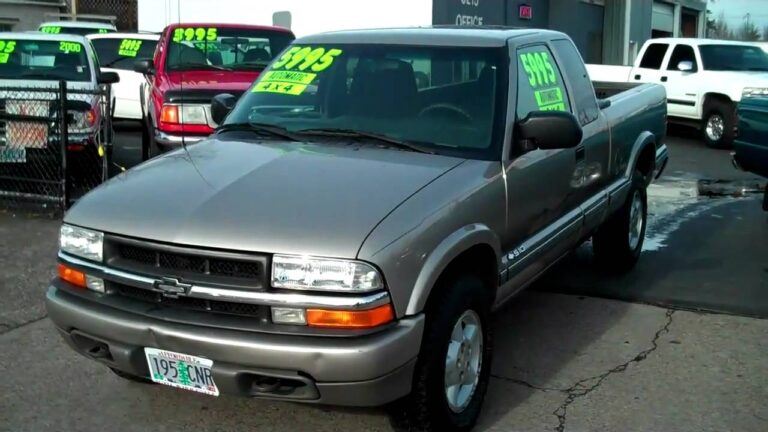1 Ton Diesel Dually Trucks For Sale: Your Ultimate Guide to Heavy-Duty Hauling
1 Ton Diesel Dually Trucks For Sale: Your Ultimate Guide to Heavy-Duty Hauling cars.truckstrend.com
The roar of a diesel engine, the imposing stance of dual rear wheels, and the promise of unparalleled towing and hauling capacity – these are the hallmarks of a 1-ton diesel dually truck. More than just oversized pickups, these magnificent machines are purpose-built workhorses, designed to tackle the most demanding tasks with unwavering strength and stability. Whether you’re a commercial hauler, a dedicated RV enthusiast, an agricultural powerhouse, or someone who simply demands the absolute best in truck capability, understanding the market for 1-ton diesel dually trucks for sale is crucial.
This comprehensive guide will delve into what makes these trucks special, why they are indispensable for certain applications, what to look for when buying, and how to navigate the diverse market to find the perfect heavy-duty partner for your needs.
1 Ton Diesel Dually Trucks For Sale: Your Ultimate Guide to Heavy-Duty Hauling
Understanding the 1-Ton Diesel Dually: What Makes Them Special?
At its core, a 1-ton diesel dually is a heavy-duty pickup truck equipped with a robust diesel engine and a rear axle featuring dual wheels on each side (four wheels in total at the back). Let’s break down these key components:
- "1-Ton" Rating: This designation is a historical classification and doesn’t literally mean the truck can carry only one ton (2,000 lbs). Instead, it refers to a class of heavy-duty trucks typically rated for Gross Vehicle Weight Ratings (GVWR) exceeding 10,000 lbs, placing them in Class 3 or even Class 4 (for some F-450 or Ram 4500 models). This rating signifies their capability to handle significantly heavier payloads and towing capacities than their half-ton or three-quarter-ton counterparts.
- Diesel Engine: The heart of these beasts. Diesel engines are renowned for their high torque output, which is essential for initiating and sustaining heavy loads. They also offer superior fuel efficiency when under load compared to gasoline engines, boast remarkable longevity, and provide effective engine braking capabilities, crucial for controlling large trailers on descents. The dominant players in this segment are Ford’s Power Stroke, Ram’s Cummins, and GM’s Duramax engines.
- Dually (Dual Rear Wheels): The most visually distinctive feature. Having two tires on each side of the rear axle provides several critical advantages:
- Increased Stability: Wider stance significantly reduces sway and improves handling, especially with large, heavy trailers (like fifth-wheel RVs or gooseneck flatbeds).
- Higher Payload Capacity: Distributes weight over more tires, allowing for greater Gross Axle Weight Ratings (GAWR) and thus, higher payload capacity in the truck bed.
- Enhanced Traction: More rubber on the road can improve traction, particularly useful when starting from a stop with a heavy load.
- Redundancy: In case of a flat tire on one of the rear wheels, the other can temporarily support the load, allowing you to safely pull over.

![]()
Leading manufacturers offering 1-ton diesel dually trucks include Ford (F-350 Super Duty, F-450 Super Duty), Ram (3500, 4500), and Chevrolet/GMC (Silverado 3500 HD, Sierra 3500 HD).
Why Buy a 1-Ton Diesel Dually? Benefits & Applications
The decision to invest in a 1-ton diesel dually is driven by a specific set of needs that only these trucks can truly fulfill.
- Unmatched Towing Capacity: This is the primary reason most people opt for a dually. They are engineered to handle the heaviest of trailers, including large fifth-wheel travel trailers, multi-car haulers, substantial construction equipment, and gooseneck livestock trailers. Their towing capacities can easily exceed 30,000 pounds, with some reaching over 40,000 pounds.
- Superior Hauling Capability: Beyond towing, dually trucks excel at carrying heavy payloads directly in their beds. This is vital for hauling construction materials, large slide-in campers, generators, or tools for a mobile business.
- Enhanced Stability and Safety: The dual rear wheels provide a significantly more stable platform, reducing trailer sway and improving control, especially in crosswinds or during emergency maneuvers. This enhanced stability directly translates to a safer towing experience for you and others on the road.
- Diesel Engine Advantages: The high torque of a diesel engine makes pulling heavy loads feel effortless, reducing strain on the drivetrain. Their inherent fuel efficiency when working hard means fewer stops at the pump on long hauls. Furthermore, diesel engines are built to last hundreds of thousands of miles with proper maintenance, offering excellent long-term value.
- Durability and Longevity: Every component, from the frame to the suspension, brakes, and axles, is reinforced and oversized to withstand the constant demands of heavy-duty work. This robust construction contributes to their extended lifespan and reliability.
- Strong Resale Value: Due to their specialized capabilities and durability, 1-ton diesel dually trucks tend to hold their value well, especially models from reputable manufacturers with good maintenance records.

Common Applications:
- Commercial Hauling: Hotshot trucking, construction, landscaping, equipment transport.
- Recreational: Towing large fifth-wheel RVs, toy haulers, or massive boats.
Agriculture: Pulling large planters, grain trailers, or livestock trailers. - Heavy Equipment Service: Mobile mechanic trucks, welding rigs.
Navigating the Market: Where to Find 1-Ton Diesel Dually Trucks For Sale
Finding the right 1-ton diesel dually involves exploring various avenues, each with its own advantages and disadvantages.
- New Truck Dealerships:
- Pros: Latest technology, full manufacturer warranty, customizable options, financing incentives.
- Cons: Highest purchase price, immediate depreciation, limited negotiation room on new models.
- Used Truck Dealerships (including Certified Pre-Owned):
- Pros: Lower price than new, often come with some form of warranty (especially CPO), inspected and reconditioned, financing readily available.
- Cons: Higher price than private sales, selection can be limited.
- Private Sellers (Online Marketplaces): Websites like Autotrader, CarGurus, Facebook Marketplace, Craigslist, and specialized truck forums.
- Pros: Often the lowest prices, potential for direct negotiation.
- Cons: "As-is" sales, no warranty, less recourse if issues arise, requires more due diligence from the buyer.
- Auctions (Public & Commercial): Ritchie Bros., GovPlanet, local government or fleet auctions.
- Pros: Potential for significant bargains.
- Cons: Usually "as-is," limited inspection opportunities, often requires cash payment, competitive bidding.
- Specialized Brokers/Websites: Some online platforms cater specifically to heavy-duty and commercial vehicles. These can offer a curated selection and expert advice.
Key Considerations When Buying a 1-Ton Diesel Dually
Purchasing a truck of this caliber requires careful thought and a thorough evaluation process.
- Define Your Needs Precisely: What is the maximum weight you plan to tow or haul? How often? What kind of terrain will you encounter? This dictates specific requirements like 2WD vs. 4WD, axle ratio, and bed length.
- Understand Towing & Hauling Specifications:
- GVWR (Gross Vehicle Weight Rating): The maximum permissible weight of the truck itself, including fuel, passengers, cargo, and tongue weight of a trailer.
- GCWR (Gross Combined Weight Rating): The maximum permissible weight of the fully loaded truck and a fully loaded trailer combined. This is your ultimate towing limit.
- Payload Capacity: The maximum weight of cargo and passengers the truck can carry, including the tongue weight of a conventional trailer or pin weight of a fifth-wheel/gooseneck.
- Max Towing Capacity: The maximum weight a truck can tow. Always check the specific truck’s door jamb sticker and owner’s manual for precise figures, as they vary by trim, engine, axle ratio, and configuration.
- Engine Type & Year-Specific Issues (for Used Trucks):
- Ford Power Stroke (6.0L, 6.4L, 6.7L): Research specific year models. Early 6.0L and 6.4L engines had known issues; the 6.7L (2011-present) is generally considered very robust.
- Ram Cummins (5.9L, 6.7L): Known for extreme durability. The 5.9L (pre-2007.5) is popular for its simplicity. The 6.7L (2007.5-present) is powerful but includes emissions equipment.
- GM Duramax (LB7, LLY, LBZ, LMM, LML, L5P): Generally strong performers. Be aware of injector issues in early models (LB7) and emission system concerns in later ones.
Always research common problems for the specific year and engine you’re considering.
- Mileage (for Used Trucks): High mileage on a diesel truck isn’t necessarily a deal-breaker if it comes with a meticulous maintenance history. Diesel engines are designed for longevity. However, components like turbos, fuel injectors, and high-pressure fuel pumps can be costly to replace.
- Transmission: Most modern dually trucks come with robust automatic transmissions (e.g., Ford’s TorqShift, Ram’s Aisin, GM’s Allison). Ensure smooth shifts, no slipping, and proper fluid levels.
- Drivetrain (2WD vs. 4WD):
- 2WD: Lighter, slightly better fuel economy, often higher payload/towing on paper, ideal for pure highway towing.
- 4WD: Essential for off-road use, slippery conditions, or launching heavy boats on slick ramps. Often commands a higher resale value.
- Cab and Bed Configuration:
- Cab: Regular Cab (single row), Extended Cab (small rear seats), Crew Cab (full rear seats). Crew Cabs are most popular for their passenger comfort.
- Bed: Short Bed (6.5 ft) vs. Long Bed (8 ft). For fifth-wheel or gooseneck towing, a long bed is almost always preferred to prevent trailer-cab interference, especially during tight turns.
- Maintenance History (Crucial for Used): Demand detailed service records. Look for regular oil changes (using diesel-specific oil), fuel filter replacements, transmission fluid changes, differential fluid changes, and proper DEF (Diesel Exhaust Fluid) system maintenance if applicable.
- Pre-Purchase Inspection (PPI): For any used 1-ton diesel dually, a PPI by a qualified independent diesel mechanic is non-negotiable. This can uncover hidden issues (rust, frame damage, engine/transmission problems, exhaust system faults) that could save you thousands down the line.
- Aftermarket Modifications: Be wary of trucks with extensive modifications like lift kits, large tires, engine tuners, or "delete kits" (removing emissions components). While some are done professionally, others can lead to reliability issues, void warranties, or even be illegal for road use.
Tips for a Successful Purchase
- Be Patient: The right truck might not appear overnight.
- Research Specific Models/Years: Understand their pros, cons, and common issues.
- Set a Realistic Budget: Include not just the purchase price but also insurance, maintenance, fuel, and potential upgrades (e.g., fifth-wheel hitch).
- Test Drive Extensively: Drive it unloaded, and if possible, with a load similar to what you intend to tow. Listen for unusual noises, check braking, and assess overall handling.
- Negotiate Wisely: Don’t be afraid to walk away if the deal isn’t right.
Potential Challenges & Solutions
- High Purchase Price: New dually trucks are a significant investment. Consider a well-maintained used model or an older generation to save money.
- Fuel Costs: Diesel fuel is often more expensive than gasoline. However, the better fuel economy under load often offsets this, especially for high-mileage users.
- Maintenance Costs: Diesel parts and labor can be more expensive due to their complexity and specialized nature. Factor this into your budget. Find a reputable diesel mechanic specializing in your truck’s engine.
- Size and Maneuverability: Dually trucks are large and wide. Parking in tight spaces and navigating urban environments can be challenging. Utilize mirrors, cameras, and practice.
- Emissions Systems (DPF, DEF, EGR): Modern diesel trucks (post-2007.5) have complex emissions systems (Diesel Particulate Filter, Diesel Exhaust Fluid, Exhaust Gas Recirculation) that require maintenance and can sometimes be problematic. Regular proper maintenance and using the correct DEF fluid are crucial.
Estimated Price Table: 1 Ton Diesel Dually Trucks For Sale
Prices for 1-ton diesel dually trucks vary wildly based on year, mileage, condition, trim level, options, and geographic location. The table below provides rough estimated ranges for trucks in good condition. These are not guarantees but rather a guide for general budgeting.
| Make/Model | Year Range (Used) | Est. Used Price Range (USD) | Est. New Price Range (USD) | Key Features/Notes |
|---|---|---|---|---|
| Ford F-350 Super Duty | 2010-2015 | $20,000 – $40,000 | N/A | Reliable 6.7L Power Stroke post-2011; older 6.4L/6.0L can be problematic. |
| 2016-2020 | $35,000 – $65,000 | N/A | Strong 6.7L Power Stroke, updated interiors. | |
| 2021-Present | $55,000 – $85,000+ | $70,000 – $100,000+ | Latest tech, high towing capacities. | |
| Ram 3500 | 2010-2015 | $20,000 – $40,000 | N/A | Legendary Cummins 6.7L, durable powertrain. |
| 2016-2020 | $35,000 – $65,000 | N/A | High output Cummins options, refined interiors. | |
| 2021-Present | $55,000 – $85,000+ | $70,000 – $100,000+ | Most powerful Cummins, luxurious interiors. | |
| Chevy Silverado 3500HD | 2010-2015 | $18,000 – $38,000 | N/A | Robust Duramax/Allison combo. |
| 2016-2020 | $30,000 – $60,000 | N/A | Improved Duramax, comfortable ride. | |
| 2021-Present | $50,000 – $80,000+ | $65,000 – $95,000+ | Latest tech, strong Duramax, impressive towing. | |
| GMC Sierra 3500HD | 2010-2015 | $19,000 – $39,000 | N/A | Sister to Silverado, often more upscale trim. |
| 2016-2020 | $32,000 – $62,000 | N/A | Refined interiors, similar mechanicals to Silverado. | |
| 2021-Present | $52,000 – $82,000+ | $68,000 – $98,000+ | Premium option, Denali trims can exceed $100k new. |
Note: F-450 and Ram 4500 models (often chassis cabs or specialized pickups) typically command higher prices, especially new, due to their even greater capabilities and commercial focus.
Frequently Asked Questions (FAQ)
Q1: What does "1-ton" actually mean in a truck?
A1: It’s a historical classification for heavy-duty trucks, not a literal weight limit. It generally refers to trucks with a Gross Vehicle Weight Rating (GVWR) exceeding 10,000 pounds, signifying their enhanced capability for carrying and towing heavy loads.
Q2: Why choose a diesel engine over a gasoline engine for heavy towing?
A2: Diesel engines produce significantly more torque at lower RPMs, which is ideal for getting heavy loads moving and maintaining speed. They also tend to be more fuel-efficient when working hard and are built for greater longevity than gas engines.
Q3: Is a dually (dual rear wheels) always necessary for heavy towing?
A3: Not always for all heavy towing. Many single-rear-wheel (SRW) 1-ton trucks have impressive towing capacities. However, for the heaviest fifth-wheel or gooseneck trailers, or for maximum stability and safety, a dually is highly recommended and often necessary to stay within tire and axle weight ratings.
Q4: What’s the difference between GVWR, GCWR, and Payload?
A4:
- GVWR (Gross Vehicle Weight Rating): Max weight of the truck itself, including passengers, cargo, and trailer tongue weight.
- GCWR (Gross Combined Weight Rating): Max weight of the truck and trailer combined. This is your ultimate towing limit.
- Payload Capacity: Max weight the truck can carry in its bed (including passengers and cargo), calculated as GVWR minus the truck’s curb weight.
Q5: How often do I need to service a diesel truck?
A5: Service intervals vary by manufacturer and engine, but generally, diesel trucks require more frequent oil changes (often 5,000-10,000 miles, but check your manual), fuel filter replacements (crucial for diesel engines), and DEF system maintenance. Regular maintenance is key to their longevity.
Q6: Should I buy a new or used 1-ton diesel dually?
A6: New offers warranty and latest features but comes with a high price and immediate depreciation. Used offers significant savings but requires more diligent inspection (especially a Pre-Purchase Inspection by a diesel mechanic) and research into specific model year reliability.
Q7: What are common problems with older diesel trucks (pre-emissions)?
A7: Older diesel trucks (especially pre-2007.5) generally have fewer complex emissions systems, which some buyers prefer for simplicity. However, they can still have age-related issues like rust, worn suspension components, and potential for high mileage on major components (turbo, injectors) that may eventually need replacement. Research specific engine issues for the year you’re considering.
Conclusion
A 1-ton diesel dually truck is a specialized tool, a powerful testament to engineering designed for extreme capability. It’s not just a vehicle; it’s an investment in unmatched towing prowess, payload capacity, and unwavering stability. While the initial cost and maintenance can be higher than conventional trucks, the long-term value, durability, and sheer ability to perform demanding tasks make them indispensable for those who truly need their power.
By understanding what makes these trucks unique, thoroughly researching your options, and prioritizing a comprehensive pre-purchase inspection for used models, you can confidently navigate the market for 1-ton diesel dually trucks for sale. With the right research and due diligence, you’ll find the perfect heavy-duty partner to conquer any towing or hauling challenge you face.





